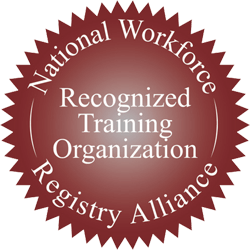Elementary

The CGMS Elementary Teacher Certification Program is a unique blend of distance learning with a low residency requirement. There are three programs offered. The Full Certification Program is MACTE-accredited and affiliated with the International Montessori Council (IMC).
Using the latest e-technology, CGMS presents video lectures and curriculum presentations offering a deep and comprehensive exploration of the Montessori approach for the elementary-age child from 6-12. Adult learners complete a variety of meaningful assignments that relate directly to their classroom experience and provide opportunities for practical application of the course material. Weekly interactions with instructors and fellow adult learners in online discussion forums and chats serve to build a rich and supportive learning community and provide additional opportunities for the integration of course topics.
The Elementary I-II (6–12) Full Certification Program is affiliated with the IMC and is MACTE accredited.
Certification Level: IMC Montessori Certification for teaching ages 6–12 years of age. (Full certification is MACTE-accredited.)
Length of Course: 26 months
Early Childhood Overview
Adult learners who do not have a Montessori Early Childhood/Primary Certificate from a MACTE-accredited Teacher Education Program must also complete an online 5-week Early Childhood Overview that is incorporated into the curriculum. This is not a prerequisite.
The Elementary I Specialization (6–9) Full Certification Program is affiliated with the IMC and is MACTE accredited.
Length, of course: 19 months (plus the 5-week EC Overview for those who do not have a Montessori EC Credential).
The Elementary II Specialization (9-12) Full Certification Program is affiliated with the IMC and is MACTE accredited.
Length of Course: 19 months ( Includes Early Childhood and Elementary I Overview- 100 hours. The EL II Specialization program includes an online 5 week course that is incorporated in the curriculum (this is not a prerequisite), followed by a week each of EL 1 Math, Language, Class Leadership, Geometry, and Biology.
Program Description for All Elementary Programs
Elementary Certificate adult learners will complete all three phases of the CGMS training program:
Distance Learning Phase – The online phase consists of learning modules with a one-week break approximately every 7-9 weeks and a two-week winter and summer break. New cohorts (groups) of adult learners begin several times a year. Adult learners follow a specific schedule of course curriculum, working with fellow students and Instructional Guides on a weekly basis. Adult learners should plan 10-15 hours per week, which can be scheduled at their own convenience, to view course video lectures and presentations, complete a variety of assignments, and participate in course discussions. Once a week students participate in a one-hour scheduled live chat session. During this phase, students will need access to a Montessori Elementary classroom for observation assignments, lesson practice, and the 9-month practicum/internship.
Residential Phase – The EL I-II Full Certification Programs require attendance at 2 residential sessions, which are held in the first summer (80 hours) and second summer (60 hours) of training. The EL 1 program requires one 80-hour residency, and the EL 2 standalone program requires one 80-hour residency held in the first summer of the course, before the practicum begins. Locations for these sessions vary from year to year. To see currently scheduled residential locations, click here.
The residential session for EL I or EL I-II introduces students to each curriculum area with a focus on the curriculum for 6-9 year old children. The second summer (El –II) focuses on the curriculum that overlaps both the 6-9 and 9-12 levels and then introduces the advanced work for 9-12. The EL II Specialization cohorts will begin with the EL I group to learn about the Cosmic Curriculum that spans the entire EL program for both levels, then focus on the curriculum that overlaps 6–9 and move into advanced lessons.
Both summer sessions provide opportunities for supervised lesson practice and material making. The emphasis on classroom leadership skills helps prepare students for the practicum phase so they are successful in translating Montessori theory and methods into daily classroom practice.
The Practicum Phase – Adult learners are required to complete a 9-month, full-day, full-school year practicum/ internship in an approved Montessori Elementary classroom. For those completing one of the EL Specialization Programs, EL I or EL II, the intern-teaching phase must take place in a classroom serving the level of specialization. Those completing the EL I-II program may complete the internship in either a Montessori Lower Elementary (typically 6–9 year olds) or Upper Elementary classroom (typically 9–12 year olds). Exceptions may be made for an alternative age grouping, at the discretion of the Director of Education, but a minimum of a 2-year grouping within these ranges is required. Classrooms must be well equipped with the Montessori elementary curriculum materials for the level served, and Montessori best practices must be followed.
Adult learners will be assigned a Field Consultant who will visit the student in the practicum classroom to provide feedback and support and to evaluate the student’s growth and progress as a Montessori Guide. CGMS makes an effort to find and contract certified Montessori consultants within reasonable driving distance of the adult learner to serve as the field consultant. When this is not possible, the adult learner or sponsoring school will be responsible for the additional travel costs for the practicum evaluation visits.
The ideal practicum experience takes place in a classroom with a certified and experienced Montessori Elementary Guide. In this situation, the student serves as an assistant-intern working under the guidance of the Supervising Teacher. This enables the student to observe and learn from the mentor teacher while increasingly developing knowledge and skills in all areas of the curriculum and in the duties of a lead Montessori Guide.
In some circumstances, students may need to complete a Self-Directed Internship. This occurs when a qualified Supervising Teacher is unavailable to work directly with the student as the lead teacher in the practicum classroom on a daily basis. Under these circumstances, the student serves as the lead teacher in the classroom while in training. A Self-Directed Internship must be approved by the CGMS Director of Education or Elementary Coordinator. A Self- Directed Support Plan must be submitted to ensure that the student has the additional guidance needed for success. All self-directed interns are assessed a fee of a minimum of $700 to cover the expense of this additional support and additional evaluations that are required by the accrediting agency. Adult learners completing an internship in a school where there is no one to provide mentorship or support may need an additional coaching plan to provide more support than what is covered in the self-directed fee provided above.



